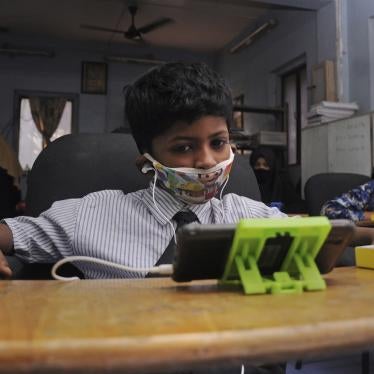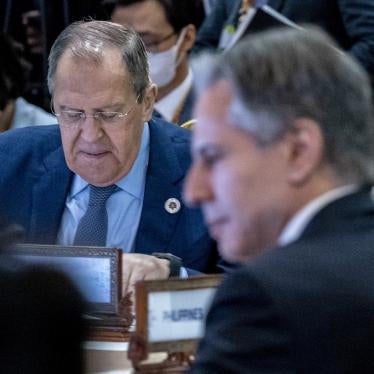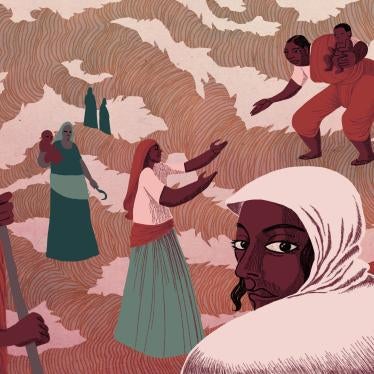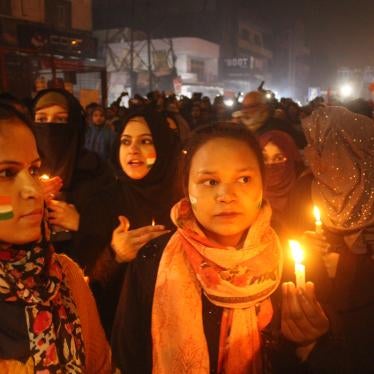Chairperson Maryam Abdullah Al Attiyah
Global Alliance of National Human Rights Institutions (GANHRI)
Geneva, Switzerland
9 March 2023
Re: Review of the Accreditation Status of the National Human Rights Commission of India
Dear Chairperson Attiyah,
We are writing on behalf of seven organizations listed below ahead of the review of the accreditation status of the National Human Rights Commission of India (NHRCI) by the Global Alliance of National Human Rights Institutions (GANHRI) Sub-Committee on Accreditation (SCA) this month. We write to raise our deep concerns regarding the commission’s lack of independence, pluralism, diversity, and accountability that are contrary to United Nations Principles relating to the Status of National Institutions (The Paris Principles). The commission has repeatedly failed to deliver its mandate, in particular to protect the rights of people from marginalized communities, religious minorities, and human rights defenders.
We strongly believe the National Human Rights Commission of India’s current ‘A’ rating is inappropriate under the circumstances, as detailed below, and we request that the GANHRI sub-committee correct it to reflect the reality of the commission.
Several signatories to this letter and numerous Indian civil society organizations had also appealed to the GANHRI’s sub-committee on accreditation in June 2021, requesting a special review of the NHRCI to evaluate its rating, following appointments to senior positions that undermined the commission’s independence.
This review is particularly crucial because, as the former United Nations High Commissioner for Human Rights Michelle Bachelet repeatedly flagged, the space for human rights defenders in India is progressively shrinking, including through use of vaguely worded laws. Activists are being arrested under terrorism and sedition laws for exercising their rights to freedom of expression and peaceful assembly, while human rights groups are being harassed through disproportionate audits and restrictions on funding.[1] There are growing attacks, discrimination, and incitement against religious minorities in India. The government has adopted laws and policies that systematically discriminate against minorities.[2]
As a long-standing member of the UN Human Rights Council, India has agreed to hold itself to the “highest standards in the promotion and protection of human rights.”[3] While presenting its candidacy for the Human Rights Council, India also pledged to continue fostering genuine participation and effective involvement of civil society in the promotion and protection of human rights and “maintain the independence, autonomy and genuine powers of investigation of national human rights bodies, including its National Human Rights Commission.”[4] India also received three recommendations in its fourth Universal Periodic Review in November 2022 to strengthen the National Human Rights Commission in line with the Paris Principles, although it has not yet indicated whether it will support those recommendations.[5] Failure to act on these recommendations would be yet another indication that India does not intend to address the concerns outlined below.
Recent developments also belie the assurances made by the NHRCI to the SCA in 2017 that it would make changes to its enabling law, and take steps to enhance its effectiveness and independence, in line with the Paris Principles and the recommendations made by the SCA during its review.[6]
In November 2016, the SCA decided to defer the re-accreditation of the NHRCI, raising concerns over lack of pluralism and gender balance among its governing body and staff, the opacity in its selection criteria, the propensity toward political appointments, the lack of constructive engagement and cooperation with civil society groups, and its backlog of complaint cases.[7] It was only following the assurances made by the NHRCI in 2017 that the SCA had recommended that it be re-accredited with ‘A’ status.
However, since 2017, instead of following through on those assurances, the functioning of the commission has further regressed, undermining its independence and adherence to the Paris Principles.
Lack of Pluralism and Opacity in the Selection Criteria
In 2019, the government of India amended the Protection of Human Rights Act without any consultation with civil society, altering the criteria of appointments. Before the amendments, the law required that the chair of the NHRCI be a former Chief Justice of the Supreme Court. The other four members had to be a current or former judge of the Supreme Court, a current or former Chief Justice of a High Court and two members having knowledge of, or practical experience in, matters relating to human rights.[8]
In 2011, 2016, and 2017, the SCA had said that the NHRCI’s composition was “unduly narrow” and restricted the “diversity and plurality of the board.” It noted that the requirement for the chair to be a former judge of the Supreme Court and the majority of the members to be recruited from senior judiciary restricted diversity and plurality. While the justification for these restrictions was based on the commission’s quasi-judicial function, the SCA said this was only one of its 10 functions and “determining the composition of the NHRCI’s senior membership in this way limits the capacity of the NHRCI to fulfil effectively all its mandated activities.”[9]
Indian authorities assured the SCA in 2017 that they would seek to amend the Protection of Human Rights Act (PHRA) to address these concerns. In 2019, the government pushed through amendments to the PHRA to instead provide that the chair could also be any former Supreme Court judge, and not just a former Chief Justice.[10] This not only fails to address the restrictive nature of appointments but also engenders an increased risk that the government will choose from among this expanded roster of potential candidates to appoint a judge prone to favor state policies and actions.
The opaque selection process helps to facilitate such compromised appointments. According to the PHRA, the chairperson and other members of the NHRCI are appointed by the President based on the recommendation of a committee consisting of the Prime Minister, the Speaker of the House of the People (Lok Sabha), the Minister of Home Affairs, the Leader of the Opposition in the House of the People (Lok Sabha), the Leader of the Opposition in the Council of States (Rajya Sabha), and the Deputy Chairperson of the Council of States (Rajya Sabha).[11] However, since 2019 the post of the opposition leader in the Lok Sabha has been vacant, leaving only a single opposition voice in the selection committee, with all others belonging to members of the ruling political coalition until August 2022.[12]
This became apparent during the appointment of former Supreme Court judge, Arun Mishra, as chair of the commission on May 31, 2021, despite strong disagreement by the lone opposition voice in the selection committee.[13] Mishra’s appointment prompted widespread criticism from legal experts and human rights groups[14] because he had delivered several judgments in favor of the government and against marginalized and vulnerable populations.[15] Mallikarjun Kharge, leader of the opposition in the Rajya Sabha, who had raised a specific point of dissent during the discussions in selection committee about the lack of any candidates from the Dalit, Adivasi or minority communities, condemned the appointments, saying they “smack of partisanship and quid pro quo.”[16]
The SCA has repeatedly said that the selection process provided for in the PHRA “is not sufficiently broad and transparent.”[17] However, despite assurances to the contrary by Indian authorities, this opacity has continued.
For instance, human rights groups also raised concerns about the appointment of the former director of the national Intelligence Bureau, Rajeev Jain, as a member of the commission.[18] Previously, retired heads of the Central Bureau of Investigation and the National Investigation Agency have been appointed as members of the commission.[19] The appointment of a former high-level intelligence and security official in the decision-making body of the commission is clearly contrary to the Paris Principles, which say the appointment of members should ensure a pluralist representation of civilian society “established with, or through the presence of, representatives of nongovernmental organizations responsible for human rights and efforts to combat racial discrimination, trade unions, concerned social and professional organizations, for example, associations of lawyers, doctors, journalists eminent scientists; trends in philosophical or religious thoughts; universities and qualified experts; and parliament.”[20] It further clarifies that if a government department is included, their representatives should participate in the deliberations only in an advisory capacity.
In 2005, while hearing a petition filed by the People’s Union for Civil Liberties in the Supreme Court, challenging the appointment of a former director of the Central Bureau of Investigation as a commission member, Justice YK Sabharwal ruled that keeping in view the Paris Principles, a “police officer would be ineligible to be appointed as a member of NHRC.”[21] However, the bench was split in its decision and later, a larger bench of the Supreme Court upheld the appointment.[22] Jain’s appointment also raises concerns because of the Intelligence Bureau’s past actions, which, as leaked reports suggest, had targeted civil society organizations for opposing projects that harm the environment and accused some of them of backing armed groups – accusations that have affected the ability of these organizations to secure foreign funding or to work without harassment from authorities.[23]
Other PHRA amendments also failed to address SCA concerns over pluralism, diversity, and transparency in any serious manner. For instance, the SCA has repeatedly noted the lack of women on the governing body. The 2019 amendments to the PHRA allow that instead of two persons having knowledge of human rights to be appointed as members, three members are now to be appointed, of which at least one will be a woman.[24] In 2017, the SCA had commented on this proposed amendment saying, “having only one member who is a woman does not represent appropriate gender balance.”[25]
Similarly, the SCA had noted that the presence of “deemed members” from other national commissions on minorities, scheduled castes, scheduled tribes, and women in the NHRCI did not sufficiently ensure pluralism because it had received reports that they rarely attended “meetings where decisions on the focus, priorities and core business of the NHRCI’s nonjudicial functions are made.”[26] The PHRA amendments, instead of addressing this concern, simply expanded deemed membership to include chairs of commissions for “backward classes,” child rights, and persons with disabilities.[27]
The Indian government has also failed to act upon the recommendations made by then UN High Commissioner for Human Rights Zeid Ra'ad al-Hussein in 2017 in a letter to the minister for external affairs, one of which was to establish an open, transparent, and merit-based selection process for the members of the governing body of the NHRCI by giving equal representation to all sections of the society. The letter also recommended appointing a non-voting advisory council to the governing body comprising nongovernmental organizations, civil society groups, and independent experts.[28]
Political Appointments
The PHRA requires that the union government appoint a civil servant with the rank of Secretary to take the role of Secretary General, and a police officer of the rank of Director General of Police or above to take the post of Director (Investigations).
The SCA has repeatedly emphasized that a fundamental requirement of the Paris Principles is that a national human rights institution is, and is perceived to be, able to operate independent of government interference or undue influence. Where members are seconded from the public service, it raises question about its capacity to function fully independently. The SCA has recommended that the Secretary General and Director of Investigations be recruited through open, merit-based selection processes.[29] The SCA also raised concerns about the practice of having police officers and former police officers involved in the investigation of human rights violations, particularly in circumstances where the alleged perpetrators are themselves members of security services. It has recommended that the commission diversify the composition of its investigative team beyond police officers.[30]
However, instead of addressing these concerns and bringing the PHRA in line with the Paris Principles, the 2019 amendments now allow the Secretary General to exercise all administrative and financial powers (except judicial functions), subject to the chairperson’s control.[31] The earlier version of the Act allowed the Secretary General to exercise powers as may be delegated to them by the chairperson or the commission.
Lack of Constructive Engagement with Civil Society Groups
The SCA has repeatedly said that it has received extensive information from various human rights organizations indicating that “the relationship between the NHRCI and civil society is not effective or constructive, particularly with respect to ongoing dialogue and follow-up on issues raised.”[32]
Since 2014, the Indian government has increasingly targeted civil society, especially human rights defenders and groups critical of its policies. The government has shut down foreign funding for thousands of civil society groups, particularly those that work on human rights or the rights of vulnerable communities, using the Foreign Contribution Regulation Act (FCRA).[33] Several UN bodies have warned that the FCRA is being used to silence dissent. In October 2020, the then UN High Commissioner for Human Rights Michelle Bachelet said that the act is “indeed actually being used to deter or punish NGOs for human rights reporting and advocacy that the authorities perceive as critical in nature.”[34]
People who protest or criticize the government are frequently labeled “anti-national” and the authorities target them by bringing politically motivated criminal cases under the broadly worded counterterrorism law, the Unlawful Activities Prevention Act (UAPA), sedition law, or by alleging financial fraud or irregularities.[35]
The authorities are presently wrongfully prosecuting 18 human rights defenders under the UAPA who participated in protests against the Citizenship Amendment Act, 2019, blaming them for the communal violence in Delhi in February 2020 that left 53 people dead and hundreds injured, most of them Muslim. Muslim victims said that the police failed to respond adequately and were at times complicit in these attacks. Courts have found that police investigations were marked by bias, delays, inaccuracy, lack of proper evidence, and failure to follow proper procedures.[36]
The Indian government arrested 16 prominent human rights defenders working on rights of India’s most marginalized communities under the UAPA in relation to anti-caste violence that took place in Bhima Koregaon in Maharashtra state in January 2018.[37] They are accused of being members of a banned Maoist organization and of inciting violent protests despite proof that evidence was planted against them.[38] One of the defenders, Stan Swamy, 84, a well-known tribal rights activist, died in July 2021 in custody, prompting the UN Special Rapporteur on Human Rights Defenders to say his death “will forever remain a stain on India’s human rights record.”[39] Former UN High Commissioner Bachelet also raised concerns over the use of the UAPA against human rights activists.[40]
However, the NHRCI has remained silent on these cases, failing to protect human rights defenders or intervene in a timely manner. The commission has also proven unwilling to work with human rights organizations to address growing attacks on the rights to freedom of expression and peaceful assembly.
In June 2018, merely seven months after his appointment as the commission’s special monitor on the issues of minorities and communal violence, the human rights activist Harsh Mander resigned from the role citing the commission’s continued silence on several urgent issues requiring its intervention.[41] This included not speaking out on extrajudicial killings targeting minorities in Uttar Pradesh and Haryana states, as well as on Mander’s report documenting the conditions inside Assam’s detention centers for irregular immigrants.
The Jammu and Kashmir state human rights commission was abolished after the change of status of the region in August 2019 and the union government tasked the NHRCI with dealing with human rights concerns in the Union Territory.[42] Since then, Indian authorities have been arbitrarily restricting free expression, peaceful assembly, and other basic rights in Jammu and Kashmir in violation of international law.[43] The government has repeatedly shut down the internet in the Muslim-majority region.[44] There are growing restrictions on media, a number of journalists and human rights defenders have been arrested on spurious terrorism charges, and authorities regularly harass critics, including through use of counterterrorism raids.[45] The authorities have also failed to protect minorities who have been targeted by armed groups. However, the commission has not set up a regional office there, leaving people in the region suffering from decades of human rights abuses to face even greater challenges in reporting violations and accessing redress for their grievances.
We hope that the Sub-Committee on Accreditation will consider our submission in the light of these circumstances and evaluate NHRCI’s rating carefully during the accreditation process.
Yours sincerely,
Amnesty International
CSW
Front Line Defenders
Human Rights Watch
International Commission of Jurists
International Federation for Human Rights (FIDH)
World Organisation Against Torture (OMCT)
[1] “Bachelet dismayed at restrictions on human rights NGOs and arrests of activists in India,” News release from the Office of the United Nations High Commissioner for Human Rights, October 20, 2020, https://www.ohchr.org/en/NewsEvents/Pages/DisplayNews.aspx?NewsID=26398&LangID=E (accessed June 8, 2021).
[2] “India: Government Policies, Actions Target Minorities,” Human Rights Watch news release, February 19, 2021, https://www.hrw.org/news/2021/02/19/india-government-policies-actions-target-minorities; “India: Surge in Summary Punishments of Muslims, Human Rights Watch news release, October 7, 2022, https://www.hrw.org/news/2022/10/07/india-surge-summary-punishments-muslims (accessed March 2, 2023).
[3] United Nation General Assembly resolution, A/RES/60/251, April 3, 2006, https://www2.ohchr.org/english/bodies/hrcouncil/docs/A.RES.60.251_En.pdf (accessed June 15, 2021).
[4] India’s Candidature for Human Rights Council for 2019-2021, Voluntary Pledges and Commitments in accordance with United Nations General Assembly resolution 60/251, August 2018, https://www.universal-rights.org/wp-content/uploads/2018/08/Pledges-and-voluntary-commitments.pdf (accessed June 15, 2021).
[5] UN Human Rights Council, Report of the Working Group on the Universal Periodic Review: India, UN Doc. A/HRC/52/11, December 14, 2022, Recommendations 151.58-151.60 (Germany, Mali, Uzbekistan), https://documents-dds-ny.un.org/doc/UNDOC/GEN/G22/606/71/PDF/G2260671.pdf?OpenElement (accessed March 6, 2023).
[6] “Report and Recommendations of the Session of the Sub-Committee on Accreditation,” GANHRI, November 2017, https://ganhri.org/wp-content/uploads/2019/11/SCA-Report-November-2017-ENG.pdf (accessed June 8, 2021).
[7] “Report and Recommendations of the Session of the Sub-Committee on Accreditation,” GANHRI, November 2016, https://ganhri.org/wp-content/uploads/2019/11/SCA-Final-Report-Nov-2016-English.pdf (accessed June 8, 2021).
[8] Protection of Human Rights Act, 1993, as amended by the Protection of Human Rights (Amendment) Act, 2006, No. 43 of 2006, s. 3 (2), https://nhrc.nic.in/sites/default/files/PHRA_Bilingual_2018.pdf (accessed June 8, 2021).
[9] “Report and Recommendations of the Session of the Sub-Committee on Accreditation,” GANHRI, May 2011, https://www.ohchr.org/Documents/Countries/NHRI/GANHRI/SCA%20REPORT%20MAY%202011%20-%20FINAL%20(with%20annexes).pdf (accessed June 8, 2021).
[10] Protection of Human Rights (Amendment) Act, No. 19 of 2019, s. 3(2)(i), https://nhrc.nic.in/sites/default/files/PHR_ACT2019_27012020_1.pdf (accessed June 9, 2021).
[11] PHRA, s.4.
[12] In August 2022, the deputy chairperson of the Rajya Sabha also became an opposition voice after his party pulled out of the ruling political coalition.
[13] “Controversial Judge Who Praised Modi Will Head National Human Rights Commission Now” Wire.in, June 1, 2021, https://thewire.in/government/controversial-judge-who-praised-modi-to-be-nhrc-chief-opposition-leader-dissents (accessed June 8, 2021).
[14] ”Choosing Justice Mishra as new NHRC chief a 'brazen blow' to rule of law, human rights,” Counterview, June 3, 2021, https://www.counterview.net/2021/06/choosing-justice-mishra-as-new-nhrc.html?m=1 (accessed June 15, 2021).
[15] Alok Prasanna Kumar, “Justice Arun Mishra to Head NHRC: ‘Ignoble’ Record Haunts Chair,” The Quint, June 3, 2021, https://www.thequint.com/voices/opinion/justice-arun-mishra-national-human-rights-commission-head-implications-supreme-court-controversial-judgments#read-more (accessed June 8, 2021).
[16] “Justice Arun Mishra takes over as NHRC chief, Congress leader opposes his appointment,” Scroll.in, June 2, 2021, https://scroll.in/latest/996461/justice-arun-mishra-takes-over-as-nhrc-chief-congress-leader-opposes-his-appointment (accessed June 8, 2021).
[17] GANHRI SCA Report, November 2016.
[18] “Appointment of Justice Arun Mishra as Chairperson, NHRC: Another Move to Subvert & Destroy Democratic Institutions,” Joint Press Statement by human rights groups and activists, June 2, 2021, http://www.pucl.org/press-statements/joint-press-statement-appointment-justice-arun-mishra-chairperson-nhrc-another-move (accessed June 10, 2021).
[19] Former Chairpersons and Members of National Human Rights Commission, India, https://nhrc.nic.in/about-us/composition_prev (accessed March 7, 2023).
[20] Principles relating to the Status of National Institutions (The Paris Principles), adopted by General Assembly resolution 48/134, December 20, 1993, https://www.ohchr.org/en/professionalinterest/pages/statusofnationalinstitutions.aspx (last accessed June 10, 2021).
[21] People’s Union of Civil Liberties v. Union of India and Anr., Supreme Court of India, W.P. (Civil), 105 of 2004, January 18, 2005, https://indiankanoon.org/doc/1731603/ (accessed June 10, 2021).
[22] “Public view no yardstick for constitutional appointments: SC,” Outlook magazine, April 29, 2005, https://www.outlookindia.com/newswire/story/public-view-no-yardstick-for-constitutional-appointments-sc/295445 (accessed June 10, 2021).
[23] Amitav Ranjan and Priyadarshi Siddhanta, “IB report to PMO: Greenpeace is a threat to national economic security,” Indian Express, June 11, 2014, https://indianexpress.com/article/india/india-others/ib-report-to-pmo-greenpeace-is-a-threat-to-national-economic-security/ (accessed June 10, 2021).
[24] Ibid., s.3(2)(ii).
[25] GANHRI SCA Report, November 2017.
[26] GANHRI SCA Report, November 2016.
[27] PHRA, 2019, s.3(3)(i) and (ii).
[28] Letter from the Office of the High Commissioner for Human Rights, April 12, 2017, https://ainni.in/wp-content/uploads/2022/09/Communication-from-the-UN-HCHR-dated-12.04.2017-to-the-Honble-MEA-of-India.pdf (accessed March 8, 2023).
[29] GANHRI SCA Reports, 2011, 2016, 2017.
[30] GANHRI SCA Report 2017.
[31] PHRA, 2019, s.3(4).
[32] GANHRI SCA Report 2017.
[33] “India Should Stop Using Abusive Foreign Funding Law,” Human Rights Watch news release, January 18, 2022, https://www.hrw.org/news/2022/01/18/india-should-stop-using-abusive-foreign-funding-law (accessed March 2, 2023).
[34] “Bachelet dismayed at restrictions on human rights NGOs and arrests of activists in India,” Office of the High Commissioner for Human Rights news release, October 20, 2020, https://www.ohchr.org/en/press-releases/2020/10/bachelet-dismayed-restrictions-human-rights-ngos-and-arrests-activists-india?LangID=E&NewsID=26398 (accessed March 2, 2023).
[35] “India: Arrests of Activists Politically Motivated,” Human Rights Watch news release, September 6, 2020, https://www.hrw.org/news/2020/09/16/india-arrests-activists-politically-motivated; “India: Government Raids Targeting Critics,” Human Rights Watch news release, September 17, 2021, https://www.hrw.org/news/2021/09/17/india-government-raids-targeting-critics (accessed March 2, 2023).
[36] “India: End Bias in Prosecuting Delhi Violence,” Human Rights Watch news release, June 15, 2020, https://www.hrw.org/news/2020/06/15/india-end-bias-prosecuting-delhi-violence (accessed March 2, 2023).
[37] Siddhartha Deb, “The unravelling of a conspiracy: were the 16 charged with plotting to kill India’s prime minister framed?” Guardian, August 12, 2021, https://www.theguardian.com/world/2021/aug/12/bhima-koregaon-case-india-conspiracy-modi (accessed March 2, 2023).
[38] Niha Masih and Joanna Slater, “Evidence found on a second Indian activist’s computer was planted, report says,” Washington Post, July 6, 2021, https://www.washingtonpost.com/world/2021/07/06/bhima-koregaon-case-india/ (accessed March 2, 2023).
[39] “India: Death in custody of priest Stan Swamy is devastating – UN expert,” Office of the High Commissioner for Human Rights news release, July 15, 2021, https://www.ohchr.org/EN/NewsEvents/Pages/DisplayNews.aspx?NewsID=27313&LangID=E (accessed March 2, 2023).
[40] “Bachelet dismayed at restrictions on human rights NGOs and arrests of activists in India,” Office of the High Commissioner for Human Rights news release, October 20, 2020, https://www.ohchr.org/EN/NewsEvents/Pages/DisplayNews.aspx?NewsID=26398 (accessed March 2, 2023).
[41] Gaurav Vivek Bhatnagar, “Harsh Mander Resigns as Special Monitor, Cites NHRC Silence on Encounter Killings,” Wire.in, June 25, 2018, https://thewire.in/rights/citing-nhrc-silence-on-encounter-killings-harsh-mander-resigns-as-special-monitor (accessed March 2, 2023).
[42] Umer Maqbool, “J&K No Longer Has its Own Rights Body. Here’s Why Experts Think That's a Bad Idea,” Wire.in, April 17, 2020, https://thewire.in/rights/kashmir-human-rights-nhrc (accessed June 15, 2021).
[43] “India: Repression Persists in Jammu and Kashmir,” Human Rights Watch news release, August 2, 2022, https://www.hrw.org/news/2019/08/06/india-basic-freedoms-risk-kashmir (accessed March 2, 2023).
[44] “India: Abuses Persist in Jammu and Kashmir,” Human Rights Watch news release, August 4, 2020, https://www.hrw.org/news/2020/08/04/india-abuses-persist-jammu-and-kashmir (accessed March 2, 2023).
[45] “India: Kashmiri Journalist Held Under Abusive Laws,” Human Rights Watch news release, February 8, 2022, https://www.hrw.org/news/2022/02/08/india-kashmiri-journalist-held-under-abusive-laws; “India: Kashmiri Activist Held Under Abusive Law,” Human Rights Watch news release, November 25, 2021, https://www.hrw.org/news/2021/11/25/india-kashmiri-activist-held-under-abusive-law; “India: Counterterrorism Raids Targeting Peaceful Critics,” Human Rights Watch news release, October 30, 2020, https://www.hrw.org/news/2020/10/30/india-counterterrorism-raids-targeting-peaceful-critics (all accessed March 2, 2023).








